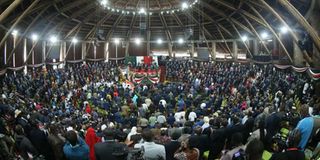BBI should give Kenyans clear path to growth

The launch of the Building Bridges Initiative report at Bomas of Kenya, Nairobi, on October 26.
Kenya has made significant progress over the years, attaining a lower middle-income economic status. With an average growth rate of about six per cent in the last decade, it’s no doubt the country is among the Africa’s transformed economies.
The shift from trickle-down economics to redistributive through counties under the 2010 Constitution marked a path to local economic development as a primary focus towards national development.
The ‘one-size-fits-all’ trickle down economic model, in part informed by the Washington Consensus later dubbed ‘Washington Confusion’ by top economist Dani Rodrick, believed in similar templates in economic progress that once countries grows at the top, development trickles down to the citizen like “manna from heaven”.
This mode of development so prescribed a top-down approach to growth. With development experience from various regions, it seems the ‘one-size-fits-all’ prescription has been challenged, since many economies that have transitioned to newly industrialised status, largely in Asia, adopted an heterodox model coined to their own forms of governments, cultures, geographical locations as well as religious believes inter alia.
Eco-social market economy
It shows therefore that depending on such factors, countries can coin models that suit their situation without following the global template of growth that’s always unsuitable in sub-Saharan Africa and Latin America.
Which is why it is expected that the proposals by the Building Bridges Initiative should lead to a radical shift in our economic model if Kenya must achieve higher income. The BBI report has proposed an eco-social market economy for the nation.
The model is focused on factoring sustainable use of natural resources in our quest for higher incomes what free market economics alone cannot deliver and thus the need for government interventions. This proposal means that social fairness, protection of the environment and an innovative market economy would be needed.
For example, the eco-social market economy will shift Kenyans’ fiscal policy towards increased environmental related taxes and lower income taxes.
Further, it will entrench the focus on global policy commitments such as the United Nation’s Agenda 2030 on Sustainable Development Goals.
No doubt this is an economic model that has the potential to enhance the pace of economic development in our country.





